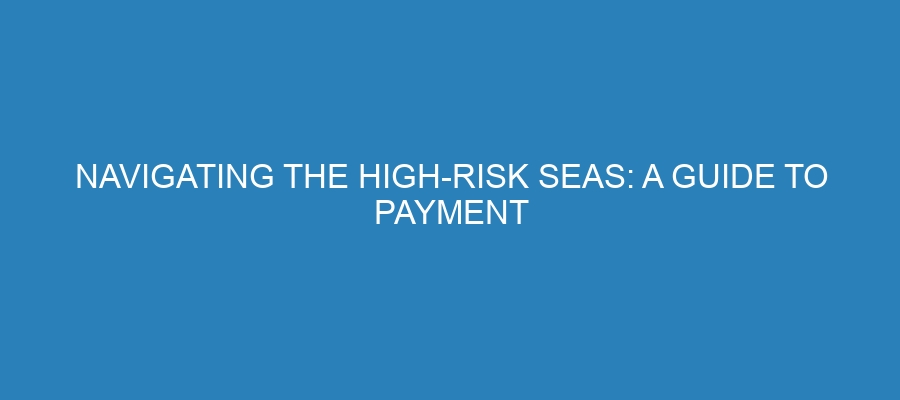In the ever-evolving world of online commerce, your payment gateway is the lifeboat that keeps your business afloat. While smooth sailing may seem appealing, many business owners encounter turbulent waters—particularly in high-risk industries. The critical role of a payment gateway cannot be overstated, especially when the financial stakes are high, and the risks are higher. Whether you’re a startup or a seasoned company, understanding the ins and outs of payment gateways can help ensure your business thrives. In this guide, we will dive deep into the abyss of high-risk payment gateways, equipping you with the knowledge you need to navigate these treacherous waters successfully.
What Is a payment gateway?
At its core, a payment gateway is the technology that processes credit card transactions for e-commerce businesses. Most customers may only see the face of this technology—the gleaming interface that accepts their payment details—but behind the scenes, a lot is happening. The payment gateway serves as a bridge between the customer, your business, and the bank, ensuring that money moves securely and efficiently.
Why Are Some Businesses Considered High-Risk?
Certain industries are labeled as “high-risk” due to factors like chargebacks, legalities, or poor credit ratings. Common high-risk sectors include:
- Adult Entertainment
- Travel and Tourism
- Gambling
- Nutraceuticals
- Subscription Services
When you operate in a high-risk space, obtaining a payment gateway becomes a complex task, often accompanied by higher fees and stricter terms.
Understanding the Risks
Chargebacks
One of the most glaring risks for high-risk businesses is chargebacks—when a customer disputes a transaction with their bank. Chargebacks can eat into your profits, leading to significant financial losses. Many high-risk payment processors will scrutinize your chargeback ratio and may terminate your account if it exceeds acceptable limits.
Fraud
High-risk industries are more susceptible to fraudulent transactions, which can cripple your bottom line. A reliable payment gateway comes equipped with advanced fraud detection measures to help mitigate this risk.
Compliance
Compliance with legal and industry-specific regulations is crucial for high-risk businesses. A trustworthy payment gateway will ensure that your payment processing methods adhere to standards such as PCI DSS (Payment Card Industry Data Security Standards).
Choosing the Right payment gateway
Navigating the options available for high-risk payment gateways can seem daunting, but a few key players stand out in the crowded sea.
1. PaymentCloud
Known for its flexibility and tailored services for high-risk businesses, PaymentCloud provides an array of solutions that can cater to your unique needs. They understand the complexities involved and offer features designed to simplify your payment processing experience.
2. Authorize.Net
This reputable name in the payment gateway industry also provides options for high-risk businesses. With their robust customer support and proven track record, they may serve as a viable option depending on your specific requirements.
3. Specialized Providers
There are several specialized payment processors for niche industries. Research your specific industry to find providers that have experience in your sector.
How to Set Up Your payment gateway
Once you’ve chosen a payment gateway, the next step is setting it up. Here’s a streamlined approach to ensure you don’t miss anything crucial:
-
Application: Fill out your application, providing all necessary information about your business, such as transaction history and chargeback rates.
-
Documentation: Be prepared to submit documents related to your business, including licenses, incorporation papers, and identification.
-
Integration: Ensure your payment gateway integrates seamlessly with your website or e-commerce platform.
-
Testing: Before going live, conduct thorough testing to ensure that your payment process is functioning as it should.
FAQs
What fees can I expect from a high-risk payment gateway?
Fees vary depending on the provider and industry, but they may include transaction fees, monthly fees, and chargeback fees. Expect to pay higher rates than standard payment processors.
How do chargebacks affect my business?
High chargeback rates can lead to account termination with your payment processor and possible fines. It’s crucial to manage customer expectations to minimize disputes.
Can I switch payment gateways later?
Yes, but switching can be complicated and may involve migrating customer data and transaction histories. It’s best to choose your payment gateway wisely from the start.
Are there alternative payment methods for high-risk businesses?
Yes, consider additional options like cryptocurrency, PayPal, or other digital wallets. However, these alternatives may not fully replace traditional payment processing.
What should I do if I get denied by a payment processor?
If your application is denied, consider contacting specialized providers or seeking professional advice to understand how to enhance your eligibility.
Conclusion
Navigating the high-risk seas of payment gateways does not have to be a tempestuous journey. By understanding the intricacies involved and choosing the right provider, you can secure your business’s financial transactions and avoid potential pitfalls.
If you find the waters too choppy to navigate alone, consider reaching out to experts who specialize in merchant processing solutions. At Payminate.com, you can find a team that understands your unique challenges and can guide you through to smoother sailing in the world of financial transactions. Don’t leave your business’s fate to chance; let the experts steer you away from trouble!

